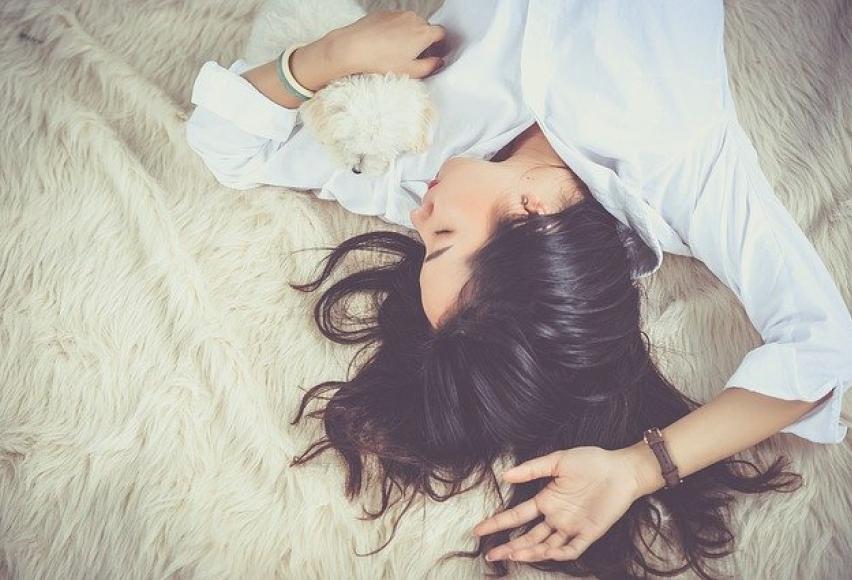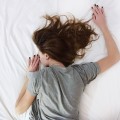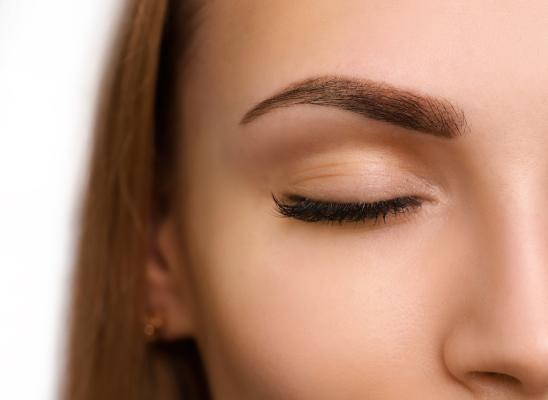Sleep Quality and Hair Pulling: What’s the Connection?

Online test
Find out the severity of your symptoms with this free online test
 When it comes to physical health, the benefits of healthy lifestyle habits are well-known. Actions like maintaining a proper diet, exercising, not smoking, and getting enough sleep have been shown to improve many health conditions. What you might not know is that lifestyle habits can also have an effect on mental health. A growing body of evidence has linked healthy lifestyle habits to improvement in conditions like depression, anxiety, and ADHD. Now, research suggests that sleep quality can have a major impact on trichotillomania (TTM).
When it comes to physical health, the benefits of healthy lifestyle habits are well-known. Actions like maintaining a proper diet, exercising, not smoking, and getting enough sleep have been shown to improve many health conditions. What you might not know is that lifestyle habits can also have an effect on mental health. A growing body of evidence has linked healthy lifestyle habits to improvement in conditions like depression, anxiety, and ADHD. Now, research suggests that sleep quality can have a major impact on trichotillomania (TTM).
A new study in the journal Comprehensive Psychiatry looked at the effects of sleep quality on trichotillomania (TTM) and skin-picking disorder (SPD). What they found could be a game-changer for people dealing with body-focused repetitive behaviors.
Why Sleep Matters
While the effects of sleep are not completely understood, it is well-documented that disrupted sleep affects how we feel, physically and emotionally, and can even affect cognitive functioning and performance. Sleep is the time when the brain is cleansing itself of toxins and refueling itself for the next day. When that cycle is disrupted, it can make getting through the day just that much harder. Over time, it can have detrimental effects on physical and emotional well-being.
Poor sleep quality has been specifically associated with several mental health issues including depression, anxiety, attention, emotional dysregulation, and impulsivity. Many people living with trichotillomania and other body-focused repetitive behaviors (BFRBs) also experience anxiety or depression, poor stress tolerance, and impulsivity. So, it makes sense that one might wonder how sleep might impact a person with trichotillomania. In fact, a 2017 internet survey of people with trichotillomania or skin-picking disorder asked that very question. Respondents reported more problems with sleep than those without TTM or SPD. Sleep problems were also associated with symptom severity. So, these findings, taken together, suggest that sleep quality may play a significant role in the experience of TTM or SPD.
The Study
With little evidence in the literature and mounting anecdotal evidence, this is thought to be the first study to examine sleep quality and its associations with symptom severity, perceived stress, and impulsivity in adults with TTM and SPD. The researchers hypothesized that poor sleep would be associated with greater symptom severity for people with TTM or SPD.
The study found that participants with TTM or SPD experienced poorer quality sleep than those who did not have TTM or SPD. Older age, poor stress tolerance, and a higher degree of impulsivity negatively impacted sleep quality for adults with BFRBs. Poor quality of sleep was associated with more severe hair pulling but not with the severity of skin picking. The presence of a comorbid mental health issue was also associated with sleep disturbance. Just why sleep is disturbed with TTM and other disorders is not clear. It has been suggested that there are neurochemical or hormonal underpinnings such as cortisol or sex hormone levels that exert effects on behaviors affecting sleep. More research is needed in that area.
These findings suggest that sleep quality seems to play a significant role in the severity of TTM. Previous research has demonstrated the effects of sleep quality on other mental health issues. What does this mean for someone with TTM? Improving the quality of one’s sleep could have significant positive effects for someone living with TTM.
Understanding Sleep Quality
Improving sleep is more than just increasing the amount of time one spends in bed. It is also about improving the quality of that sleep. Quality sleep means that your sleep is restful, restorative, and rejuvenating. It’s the difference between tossing and turning all night and sleeping deeply and peacefully through the night.
During sleep, you experience two distinct “cycles” of sleep – deep sleep and REM sleep. Deep sleep is a period of progressively deeper levels of sleep. This deep sleep is associated with physiological changes that restore energy and help boost immune system functioning. It is also during this deep sleep that your brain is cleansing and replenishing itself. This process occurs only during deep sleep and not when awake. Getting enough deep sleep is associated with feeling alert and better brain health. REM sleep is that cycle of sleep where dreaming occurs. It is thought that REM sleep is related to learning and memory, and emotional health and regulation.
Both types of sleep are important for physical and emotional well-being. Poor sleep can result in the disruption of key neurotransmitters and stress hormones, affect brain function, and impair thinking and emotional regulation – all factors that play a role in TTM and other mental health issues.
One of the challenges for people with TTM is being able to “power down.” Evidence suggests that people with stress-related issues like TTM are often on “high alert” and have difficulty settling into sleep. One of the culprits is thought to be excessive levels of cortisol, the stress hormone that the body releases in response to a perceived threat or emergency Instead of rising and falling over the course of the day, levels remain high making rest difficult.
Even if you’re historically a “poor sleeper”, there are things you can do to improve your sleep. And, it all starts with something called sleep hygiene.
Sleep Hygiene
Sleep hygiene refers to behaviors and practices that promote good quality sleep. How many times have you fallen into bed exhausted, only to be still wide awake two hours later? Your body is tired but your brain hasn’t settled down yet. That makes for a rough night’s sleep. For most people, good, sound sleep is the result of certain actions that they take each night that signals to the body and brain to begin the process of powering down.
Practicing good sleep hygiene has been shown to significantly improve the quality of sleep. While the specific techniques can vary somewhat, here are strategies that have shown to be effective in promoting more sound sleep.
Set A Sleep/Wake Schedule
A schedule establishes a routine and signals to your brain when it’s time to sleep or wake. It helps to set the sleep/wake rhythm.
- Set a time to go to bed and a time to get up.
- Keep to this schedule as much as possible, even on days off or weekends.
- Be careful with naps. For some people, napping makes falling asleep later more difficult.
Establish an Evening Ritual
An evening ritual consists of the things that you routinely do to prepare for bed. Each part of the routine should be something that encourages relaxation and signaling that bedtime is approaching. Aim to begin your ritual at least 30 minutes before bed. Your routine might include:
- Relaxation time – set aside some time prior to bed to relax and wind down from the day. It might be some meditation, a warm bath, listening to soft music, or gentle stretching.
- Dim the lights. Dimming the lights encourages your brain to begin melatonin production.
- Unplug. Power down your electronics. The blue light emitted from screens can be over-stimulating and keep you awake.
Make Your Room Comfortable
A comfortable room is inviting and relaxing. Think about your bed as well as your surroundings when making your room more sleep-friendly.
- Make sure your room is cool and dark.
- Use bedding that is comfortable and breathable.
- Eliminate noise. Consider a white noise machine or even earplugs.
- If you enjoy it, use calming herbal scents such as lavender or florals like ylang-ylang.
- Use the bed for sleep and sex only. Resist the urge to work or eat in bed.
What You Do During the Day Matters Too
What you do throughout the day can support your body’s natural circadian rhythm and affect how well you are able to wind down in the evening.
- Get some sun – Sunlight exposure helps to regulate your circadian rhythm and encourage a healthy wake/sleep pattern
- Exercise helps expend excess energy and promotes restful sleep.
- Minimize caffeine later in the day and evening, especially if you are sensitive.
- Minimize alcohol. It may help you fall asleep but tends to disrupt sleep later in the night.
- Avoid eating late. A heavy meal can make it hard to get comfortable and ready for sleep.
If pain or symptoms are bothersome and keeping you awake, it’s time for a conversation with your healthcare provider. There may be options for alleviating some of the symptoms that keep you awake. Sometimes, therapy can help. A special type of Cognitive Behavioral Therapy, CBT-I, can help people with insomnia achieve a better night’s rest.
The good news is that research continues and even with TTM, better sleep is possible. Learning new ways to wind down and encourage sleep takes time but the result is more restful and restorative sleep.
References
- Firth, J., Solmi, M., Wootton, R. E., Vancampfort, D., Schuch, F. B., Hoare, E., … Stubbs, B. (2020). A meta‐review of “lifestyle psychiatry”: The role of exercise, smoking, diet and sleep in the prevention and treatment of mental disorders. World Psychiatry, 19(3), 360-380. doi.org/10.1002/wps.20773
- Cavic, E., Valle, S., Chamberlain, S. R., & Grant, J. E. (2021). Sleep quality and its clinical associations in trichotillomania and skin picking disorder. Comprehensive Psychiatry, 105. Retrieved from https://doi.org/10.1016/j.comppsych.2020.152221
- Harvard Health Publishing. (2019, September 24). Sleep and mental health. Retrieved from https://www.health.harvard.edu/newsletter_article/sleep-and-mental-health
- Ricketts, E. J., Snorrason, I., Rozenman, M., Colwell, C. S., McCracken, J. T., & Piacentini, J. (2017). Sleep functioning in adults with trichotillomania (hair-pulling disorder), excoriation (skin-picking) disorder, and a non-affected comparison sample. Journal of Obsessive-Compulsive and Related Disorders, 13, 49-57. doi:10.1016/j.jocrd.2017.01.006
- Nollet, M., Wisden, W., & Franks, N. P. (2020). Sleep deprivation and stress: A reciprocal relationship. Interface Focus, 10(3), 20190092. doi:10.1098/rsfs.2019.0092
- Grant, J. E., & Chamberlain, S. R. (2018). Salivary sex hormones in adolescent females with trichotillomania. Psychiatry Research, 265, 221-223. doi:10.1016/j.psychres.2018.05.012
- Mayo Clinic. (2016, September 28). Insomnia treatment: Cognitive behavioral therapy instead of sleeping pills. Retrieved from https://www.mayoclinic.org/diseases-conditions/insomnia/in-depth/insomnia-treatment/art-20046677
Online test
Find out the severity of your symptoms with this free online test
Start your journey with TrichStop
Take control of your life and find freedom from hair pulling through professional therapy and evidence-based behavioral techniques.
Start Now



